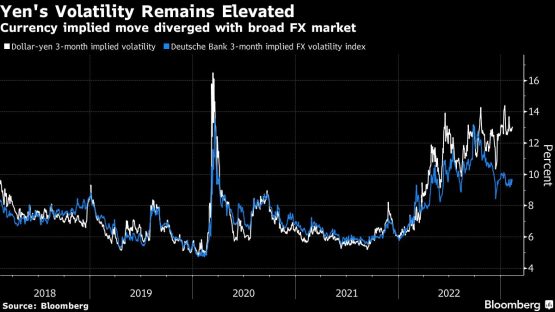Shares were mixed in Asia as investors positioned for US inflation data after a drop in wage-growth expectations eased some of the concern over rising prices.
A gauge of the region’s equities was on course to snap a two-day losing streak, with Japanese and South Korean stocks rising while those in Hong Kong and mainland China swung between gains and losses. Shares of cryptocurrency-related companies were also mixed in Asia as US financial regulators take an increasingly aggressive posture to the industry.
Futures for the S&P 500 and tech-heavy Nasdaq 100 slipped after the indexes added more than 1% on Monday, when a survey showed Americans drastically reduced their expectations for household income growth amid tighter monetary policy.
The yen held a small advance after the government officially nominated Kazuo Ueda as the next Bank of Japan governor. Bets have increased recently that the BOJ’s yield-curve control and negative-rate policies may be abolished soon under Ueda’s leadership.
Futures on 10-year bonds moved higher while the benchmark debt targeted by the BOJ was untraded Tuesday. Earlier, data showed Japan’s economy returned to growth in the three months through December, while consumption recovered, business spending contracted and inventories dragged down on the economy.
The possibility of a prolonged hiking cycle in Japan will be the swing factor for the market, according to Morgan Stanley strategists John Kalamaras and Wanting Low. “To the extent a BOJ hiking cycle does not materialize, that should help cement JPY’s status as a ‘funding currency’,” they wrote in a note. “We think more conviction is needed though that BOJ’s reaction function will not be altered and hence stay neutral in the meantime.”
A gauge of greenback strength edged lower and 10-year US Treasury yields were little changed. The New Zealand dollar extended a decline after two-year inflation expectations eased.
Meanwhile, the Hong Kong Monetary Authority bought the local currency for the first time since November to manage its peg to the dollar. Late last week, the Hong Kong dollar touched the weak end of its 7.75-7.85 trading band versus the greenback, increasing the likelihood of government intervention.
US inflation probably accelerated in January to 0.5% from December’s 0.1%, while slowing year on year to 6.2% from 6.5%, according to estimates compiled by Bloomberg.
Figures of 6.2% and 0.5% or lower would likely see US equities extend their January rally and break recent highs, Tony Sycamore, a market analyst at IG Australia Pty, wrote in a note. A reading of 6.5% or higher year-on-year would see stocks slump and the dollar rip higher, according to Sycamore.
Oil prices, a key inflation component, fell on a report that the Biden administration plans to sell more crude oil from the Strategic Petroleum Reserve. Gold rose.
Still, JPMorgan Chase & Co.’s Marko Kolanovic said that investors should be in bonds since “a recession is currently not priced into equity markets.” Morgan Stanley’s Michael Wilson argued that US stocks are ripe for a selloff after prematurely pricing in a pause in Fed rate hikes.
Some of the main moves in markets:
Stocks
- S&P 500 futures were little changed as of 1:51 p.m. Tokyo time. The S&P 500 closed up 1.1%
- Nasdaq 100 futures were little changed. The Nasdaq 100 closed up 1.6%
- Japan’s Topix index rose 0.7%
- South Korea’s Kospi index rose 0.8%
- Hong Kong’s Hang Seng Index rose 0.2%
- China’s Shanghai Composite Index was little changed
- Australia’s S&P/ASX 200 Index rose 0.1%
Currencies
- The Bloomberg Dollar Spot Index fell 0.2%
- The euro rose 0.1% to $1.0738
- The Japanese yen rose 0.3% to 131.97 per dollar
- The offshore yuan was little changed at 6.8208 per dollar
Cryptocurrencies
- Bitcoin rose 0.5% to $21,732.34
- Ether rose 0.9% to $1,500.27
Bonds
- The yield on 10-year Treasuries was little changed at 3.70%
- Australia’s 10-year yield declined two basis points to 3.74%
Commodities
- West Texas Intermediate crude fell 1.1% to $79.27 a barrel
- Spot gold rose 0.3% to $1 858.97 an ounce
© 2023 Bloomberg

